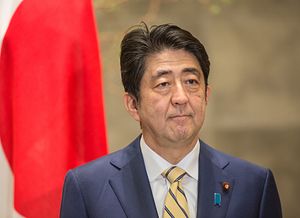Last week, as Japanese Prime Minister Shinzo Abe set out on his grand tour of Central Asia I wrote — borrowing a great term from the Mongolian parliament speaker — that Japan hoped to be the region’s “Third Neighbor.” Now, as Abe finishes his travels with a visit to Kazakhstan, it’s worth assessing what Japan achieved on the trip and if Japan is really trying to counter China in the region.
There’s justified, deep skepticism with regard to the reality of Japan becoming a major partner to the states of Central Asia. Jack Farchy and Robin Harding explore some of that conversation in a piece for the Financial Times. If Japan’s engagement in Central Asia is viewed as an attempt to counter rising Chinese influence, it will always come up short. Tokyo simply cannot offer what Beijing can. A Kazakh executive told FT that Japan’s Central Asia policy was “a real mess,” and pointed out that while a large number of Japanese companies independently bid for projects in the region — such as Kazakhstan’s planned nuclear power plant — China puts forth one bid with state backing.
Further, what Japan prides itself on bringing to the region — a higher-level technical expertise — is increasingly also being supplied by China around the world. Examples of this the FT article points to are China’s recent settling of a deal to invest in a nuclear power plant at Hinkley Point in the U.K (discussed in an exclusive piece in the upcoming Diplomat Magazine) and also Indonesia’s choice of China over Japan for a high-speed rail system.
Nonetheless, Japanese companies do appear to have some allure in Central Asia; or, alternatively, there are simply enough investment opportunities to go around. In Turkmenistan, Abe settled a raft of deals worth $18 billion. In Uzbekistan, the deals agreed on were worth $8.5 billion. In both countries, however, China has also made huge investments. During Xi Jinping’s 2013 tour of Central Asia, Tashkent and Beijing signed deals worth $15 billion. China has invested heavily in neutral Turkmenistan’s gas industry — plans are in progress to add a fourth line to the Central Asia-China gas pipeline network. Turkmenistan pumps a predominance of its gas to China.
The dollar signs next to Abe’s agreements in Kazakhstan were smaller than deals settled elsewhere — a paltry $700 million to implement 10 joint projects. According to Abe, as quoted by Tengrinews, “Japan will be assisting construction of a nuclear power plant in Kazakhstan,” but as Joanna Lillis points out over on Eurasianet, “there were no reports of any investment deals actually being signed between the two countries.” On a political level, Japan’s commitment to nuclear nonproliferation and peaceful use of nuclear power resonates, especially in Kazakhstan, but it doesn’t look like that has yet translated into profit.
Is Japan trying to counter growing Chinese influence in Central Asia? Perhaps. But if that is the core aim, Tokyo will likely be disappointed. Central Asia may have that economic frontier feel — untapped resources, big projects in need of backing — but it also is an increasingly crowded and difficult investment minefield — Russia and China dominate, corruption is rampant, and there is little political synergy between the region’s autocracies and Japan’s neatly-ordered democracy.

































